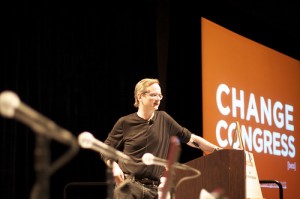
photo by Joel Housman
Lawrence Lessig is known for his focus on technology and law, especially as it applies to copyrights. A couple of years ago, he announced his intention to change his focus from copyright matters to political corruption. Earlier this year, he helped launch Change Congress, a web based project aimed at educating people about the influence of money in the political system.
Consider any public office where it’s known that a politician has accepted donations from a special interest group. We immediately assume that there is a money-for-influence scheme at work here, regardless of how “good” we perceive this politician to be. We assume that this politician abandons personal convictions when presented with a check. Sure, this isn’t a groundbreaking observation, but it’s time we fixed things and removed this taint from the system. Money corrupts democracy.
Change Congress’ immediate concern is H.R. 801, sponsored by John Conyers. This proposal forbids the government from requiring scientists who receive taxpayer funds for medical research to publish their findings openly on the Internet. Government-funded (our tax dollars) research would be available solely via for-profit journals inaccessible by the general public. Maplight.org reports that Conyers is receiving disproportionate donations from the benefiting publishing interests.
In a semi-related note, Lessig really knows how to deliver a presentation. I’ve been referring to it as “Keynote ballet”. His timing is excellent, his slides are interesting and there’s not a bullet point in sight. Beautiful.
About the title: using # symbols is a trend that’s recently caught on in Twitter. It allows people to tag the context of their discussion. Use of these “hash tags” is hotly debated, but apppears to be here to stay. This post is inspired by panels I attended at SXSW Interactive 2009.